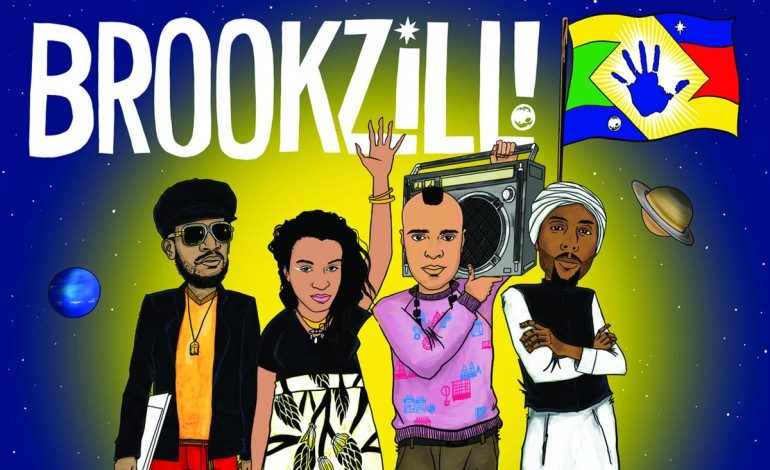

A Pleasant, Yet Unremarkable, Union
A hip-hop supergroup of sorts, Prince Paul, Ladybug Mecca, Don Newkirk and Gorila Urbano (also known as Brazilian emcee Rodrigo Brandão) have united in an alloy of musical culture and tradition. The band–toting the less-than-subtle name “Brookzill!”–incorporates elements of both Brooklyn’s hip-hop tradition and Brazil’s samba bateria. This fusion works to great effect at certain moments, but as the record progresses, becomes bogged down in repetitive motifs and samples.
The majority of the record is delivered in Portuguese, the native tongue of both Brandão and Ladybug Mecca. This decision is possibly the most effective and the most notably Brazilian aspect of this collection of music. Truly, the penmanship of these emcees rises above the album as a whole, standing as a pinnacle of innovation within the blurred lines of Throwback To The Future. In “Nascido No Ceu,” Brandão and Ladybug alternate both verses and, later, individual lines, in a stimulating turn of vocal counterpoint. Notably, this song also provides the strongest melodic material on the album, showcasing legendary flautist, keyboardist and producer Brian Jackson. Later, on the track “S. Bento MC5,” the group enlists a trio of their Portuguese-speaking counterparts, highlighting an even larger cast of emcees that wonderfully inject their Brazilian flair.
For a record in which the influence is so decidedly bipartite, Throwback To The Future finds its greatest strengths in sporadic illumination of Brazilian tradition, interspersed throughout. In interviews, Prince Paul and Brandão frequently stress the historic and sonic similarities between hip-hop and Brazilian Samba: both emerged from street culture, both are meant to incite vivacity and both rely on drums and rhythmic interplay. This truly shines through on tracks that dwell on this very comparison, achieving success with the interweaving of these two aural traditions. Kiko Dinucci contributes to “Mad Dog (In Yoruba)” wonderfully, as the intrigue of the Brazilian guitar offsets the familiarity of the break-beat introduced by Prince Paul. Additionally, “Todos Os Terreiros” throws the listener into a soundscape dominated by congas and agogo bells before providing the expected foundation of a “boom-bap” drum sample, as Brandão would call it.
In the context of modern music production, it is rare to find an ensemble that consistently records as a group, and Brookzill! proclaims to proudly break the mold of this trend. However, though this companionship leads to rhythmic successes and an intriguing concept, the band’s abundance of experience in sampling and emceeing is offset by an absence of a keen ear for the technicalities of programming and mixing. Frequently, the drum and bass loops rest far too high in the sonic spectrum, covering the far more interesting vocals and horns. And though Prince Paul is a pioneer in the realm of sampling, Diplo he is not. “Marale” is plagued by an overly simplistic synthesizer melody, looped ad nauseam. “Let’s Go (É Noiz)!” bounces unconvincingly between contrasting samples, seemingly unsure of what it wants to accomplish. “Raise the Flag” introduces a persisting, quarter-note tone that is–quite literally–painful to the ear.
In sum total, Throwback To The Future–though containing several interesting and successful moments–views itself as more of an achievement that it truly is. While Brazilian melodies, rhythms and guest artists are peppered throughout, the album is defined by the retro drum samples that dominate the aural texture. Brookzill! has oft mentioned the fact that they have been crafting this album for ten years; when the outcome is this orthodox, though, such an extensive time frame is nothing more than one fleeting facet in the creation of an enjoyable, yet unmemorable, work of art.
